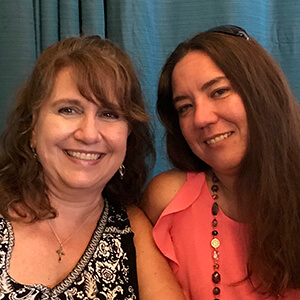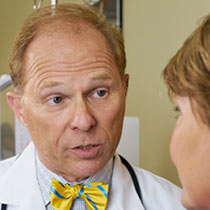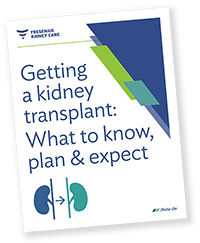What You Should Know as You Prepare for a Kidney Transplant
Right now, tens of thousands of people with kidney disease are considering or planning for a kidney transplant. If this is an option you’re starting to explore, you probably have lots of questions, and you may not even know where to start. We’re here to help.
Like any journey, getting a transplant begins with a few initial steps. Knowing what steps to take and when to take them is important, so we’ve outlined some of the information that you’ll need to get started.
If you or a loved one has kidney disease, it’s never too early to prepare for a kidney transplant. The sooner you start planning, the earlier you may be able to find a kidney. Getting a kidney transplant is a very personal experience, so you and your doctor should focus on making decisions and taking steps that are right for you and your health.
6 Steps to Starting Your Transplant Journey
Ready to get started? Below is a list of typical steps in the process of getting a kidney transplant. This information can help you figure out what to do now, as well as what to do (or expect) next.
- Discuss planning for kidney transplant with your doctor: Together you can decide if a kidney transplant is a good option—based on your health, wellbeing, and goals.
- Learn all you can about kidney transplants: The more you know, the better you’ll be able to decide what’s right for you and your health.
- Contact your local transplant center: Set up an appointment to learn about your next steps. If there’s more than one transplant center in your region, call each of them. The transplant center will order any necessary medical tests, which are a requirement before you can be added to the national kidney transplant waitlist.
- Start seeking a kidney donor: There are two basic ways to find a donor match.
- Seek a living donor through family, friends, or acquaintances.
- Register on the national kidney transplant waitlist for a donor kidney. The waitlist is managed by the United Network for Organ Sharing (UNOS).
- Surgery: The day of your transplant surgery is a big one, both medically and emotionally. Be sure to consult with your medical and care team about being prepared and arrange to have family members or friends around for support and assistance.
- Recovery: After surgery, you will stay at the hospital for a period of time to make sure your new kidney is functioning properly. You’ll also need plenty of rest, some prescribed medications, and time to heal.
Transplant Centers: Your Questions Answered
Organ transplants of all kinds are performed at specialty transplant centers. These centers are fully equipped for transplant surgery and staffed by expert care teams who are trained to educate both recipients and living donors on how to prepare for a kidney transplant. Most transplant centers are part of a hospital.
Should I register at more than one transplant center?
Yes. If there’s more than one transplant center near you, it’s recommended that you request referrals from your doctor and register at more than one center. This is called “multiple listing.” Since the travel distance between donor and recipient is a key consideration, having multiple listings may give you a better chance of getting a nearby kidney.
When should I be referred to a transplant center?
Discuss planning for kidney transplant as early as possible with your doctor. Referrals to a transplant center are typically made in stage 4 or stage 5 of chronic kidney disease (CKD). Getting accepted as a patient at the transplant center means you’ll be ready as soon as you find a kidney donor. If you are fortunate enough to get a transplant before your kidneys fail, you may be able to avoid dialysis.
How do I find a transplant center near me?
Ask your doctor for a referral to the nearest transplant center. To search all available kidney transplant centers in your region, visit the Organ Procurement and Transplantation Network (OPTN) and start by selecting “Transplant Centers by Organ.”
TIP: When choosing a transplant center, consider these factors:
- Coverage and cost under your insurance
- Whether the center performs living donations
- Location and ease of travel to and from the center
- If the center participates in a *paired kidney exchange program
*A paired kidney exchange program allows for a donor/recipient who may not be well matched to “swap” donors with another donor/recipient.
What do I need to know about insurance and the cost of a kidney transplant?
Note: Private insurance and Medicare typically cover about 80 percent of initial surgery and medication costs. A transplant insurance coordinator may be available to help you better understand your coverage to avoid gaps and be better prepared for your transplant. Your transplant center will also have a financial coordinator and/or social worker who can help you understand your insurance coverage and answer any questions.
If you’re considering or planning for kidney transplant, you may have more questions than answers. Fortunately, there are many ways to educate yourself, and you can start today! We’ve provided several helpful steps to take as you learn how to prepare for a kidney transplant, and there are plenty of professionals and experts you can turn to along the way. As always, we recommend first talking with your doctor about big medical decisions such as this one.
Suggested topics

Close Friends Bond Over a Kidney Transplant

Finding a Kidney Donor
Once your doctor has determined that you’re a good candidate for a kidney transplant, you’ll need to be matched with a kidney donor who is compatible with you in tissue and blood type...


